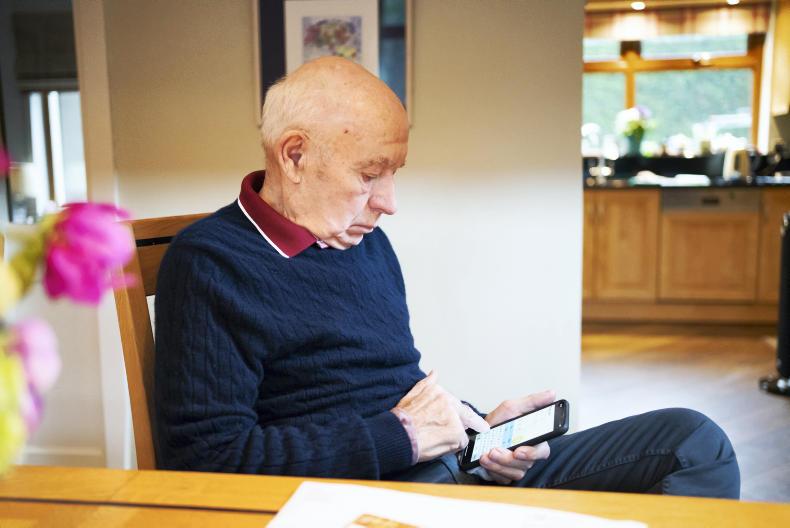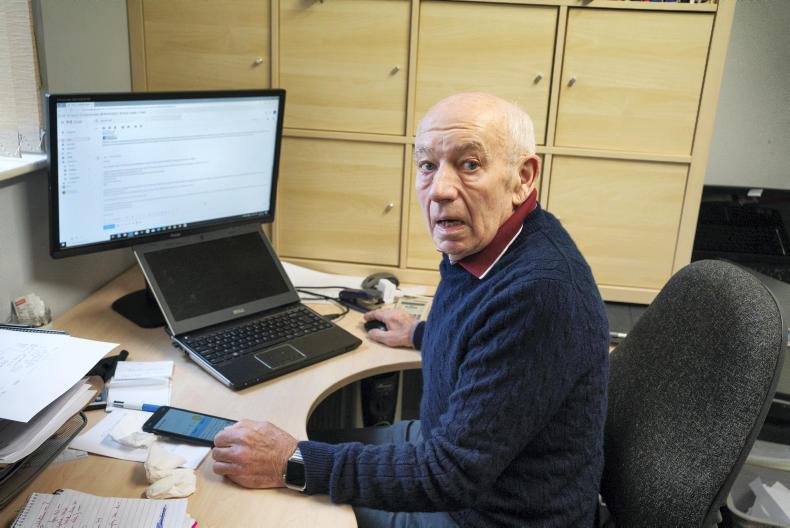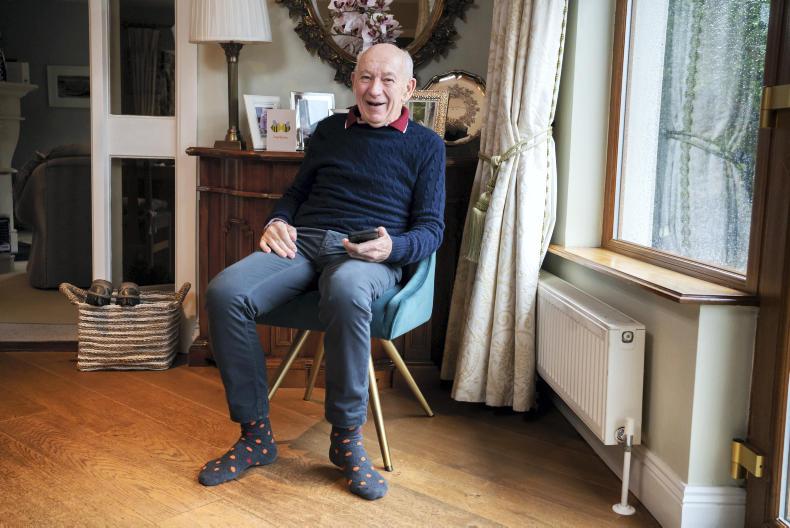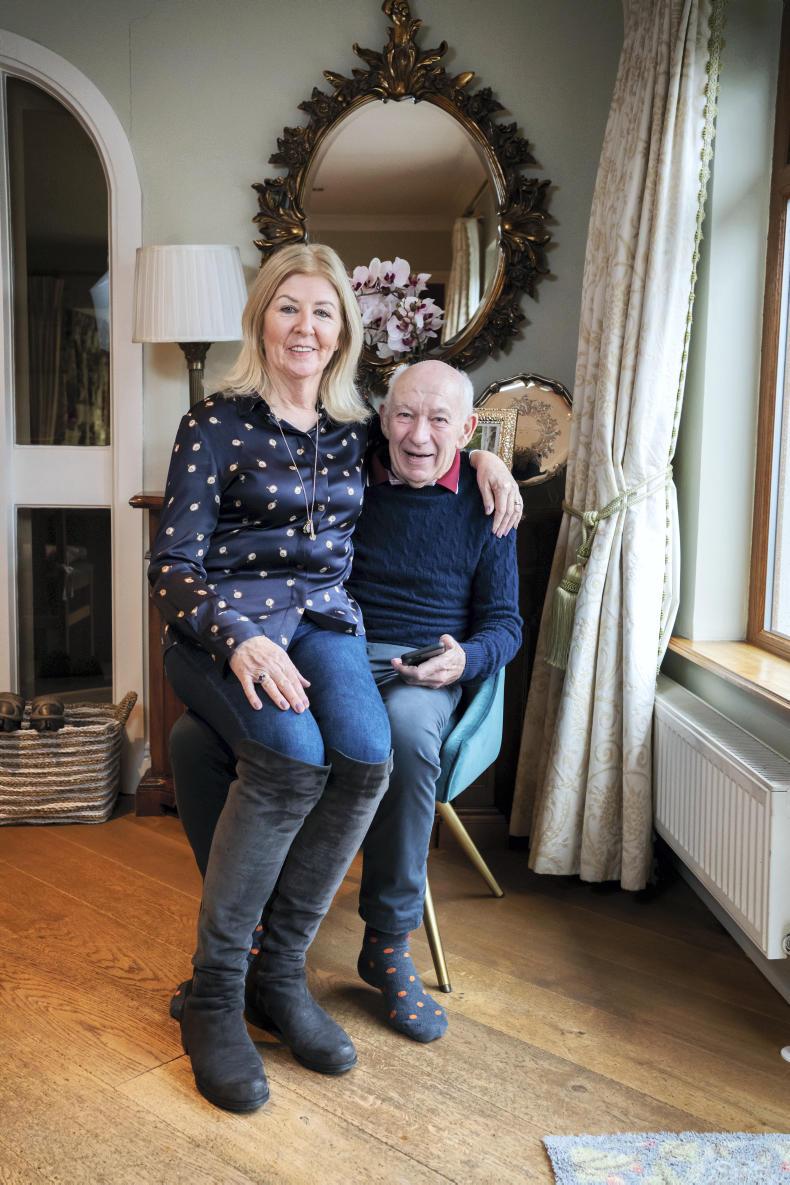Being robbed of his ability to do things – that is how Meath man Dr Noel Kavanagh describes the impact of being diagnosed with motor neurone disease (MND).
Noel is a former vet, pig management expert, consultant and former owner of Oldcastle Analytical Laboratories. Unable to speak since last September, he now communicates using speech synthesis software and by text and email.

Noel texting on his phone. What he writes is then 'spoken' using a special app that uses voice recordings he made before losing his voice. \ Barry Cronin
“MND is a devastating disease, as it progressively attacks the body,” says Dr Kavanagh. “With it, I am unable to talk. I now use my iPhone or iPad for communicating with my banked voice in English on ModelTalker and in French on Cerevoice.”
“Banked voice” refers to saved recordings of his own voice made after diagnosis that have been used to create a software-synthesised voice for use with digital media now that he needs it.
Noel was a very busy man when this disease struck. In his consultancy practice (which conducted clinical trials for pharmaceutical companies for product registration) a big part of his work involved preparing expert reports for solicitors related to product complaint investigations.
It took away my ability to speak not one language, but two
While he had sold his laboratory in 2012 and was semi-retired, he was enjoying this consultancy work and spending a lot of time in France, a lot of time sailing and was also studying hard to become fluent in French.
“MND robbed me of the ability to work in the report/writing field,” he says. “Bizarrely, when MND attacked me in 2018, it took away my ability to speak not one language, but two. It also robbed me of my hobbies – scuba diving, golf and cycling.”
In his youth he had played hockey and rugby at a high level and was also involved in motor bike and car racing before becoming interested in water sports and sailing at a high level.

Noel using technology to communicate now that he can no longer speak. \ Barry Cronin
He and his family have cruised from Howth to many ports in Europe, including Italy where he qualified as a scuba diver.
Noel was diagnosed with MND in December 2018 and symptoms had first presented themselves after a return from holiday in August.
“I had become hoarse,” he says. “That was accompanied by reflux and sinusitis. On 1 September, I developed muscle fasciculations (twitches) in both shoulders.”
I was not surprised or shocked when Professor Hardiman diagnosed MND, I already knew that all the symptoms and test results pointed to MND
Noel suspected MND himself, given the combination of symptoms but referred to a neurologist, initial test results were attributed to old sports injuries to his cervical (neck) vertebrae. More tests followed and he was diagnosed with MND by Professor Orla Hardiman in December 2018.

Noel's recent gift to himself was a BMW 8 coupe. \ Barry Cronin
“I was not surprised or shocked when Professor Hardiman diagnosed MND, I already knew that all the symptoms and test results pointed to MND, yet it was not what I wanted to hear. My instinctive reaction was to discuss, how quick is it likely to be – ie, how long have I got to live and what can be done to slow it down?”
I can now communicate so I’m not totally isolated
Following his diagnosis and knowing he would lose the ability to speak he set about “banking” his voice. As explained, voice banking involves the recording of a list of sentences into a computer. When enough recordings have been captured, software chops them up into individual sounds (phonetic units). A synthetic voice can then be built out of these phonetic units. This is called concatenative speech synthesis.
“This was very important to me because a voice is a very personal thing and being able to keep this aspect of one’s individuality and identity is important. I can now communicate so I’m not totally isolated.”
Noel types what he wants to say in a programme called Predictable, the interface between the user and the ModelTalker app on his iPhone or iPad. Predictable then uses his ModelTalker voice to speak.
Activity

But MND doesn’t stop Noel getting out and about and he attends many sporting events.
“I am a Leinster season ticket holder and a passionate supporter of rugby,” he says. “I go to most Leinster games. I support Formula 1 racing, and usually go to the Monaco Grand Prix. I also follow tennis and go to the Monte-Carlo Rolex Masters every year in April.
“My two son-in-laws share many of my interests, so we are in regular contact on WhatsApp. I also have a good circle of friends who share my interests, and keep in contact by email, WhatsApp, SMS and FaceTime.”
New diagnoses
Noel has some advice for those who have been recently diagnosed with MND. “In my view, regardless of whether you are comfortable using technology, including computers, smartphones, tablets etc, you should investigate with your speech and language therapist the systems that are available, should you lose your voice. Voice banking is best, but you must bank your voice while it is still strong.”
He advises those newly diagnosed to not stop communicating with friends and general contacts.
I find, though, that it’s best if I have someone with me so we can more easily keep the flow of conversation going, otherwise there is a lag period whilst I am typing
“I find that people are reluctant to make contact if some time has elapsed since our previous contact because they are nervous that things could be going really bad for me so I would suggest setting up WhatsApp and email groups so that you don’t lose contact.”
FaceTime is good, he says.

Noel with his wife Caroline. \ Barry Cronin
“I find, though, that it’s best if I have someone with me so we can more easily keep the flow of conversation going, otherwise there is a lag period whilst I am typing.”
He has a good phone, he says with good speakers.
“I use it for all my verbal communications and people, in general, adjust to the system quickly.”
Support is crucial
Noel believes that support from the Irish Motor Neurone Disease Association (IMNDA) is invaluable.
“The IMNDA provides regular nurse visits to support patients and assess their requirements. It is also an important support for those who may be isolated.
As patients, we are very fortunate to have Professor Orla Hardiman who is an international leader in MND research
“The provision of specialised support equipment is a crucial and vital service to patients. Without fundraising it would not be possible to finance the support programmes.
“Support is also provided by the IMNDA to cover the cost of reflexology, counselling and more. As patients, we are very fortunate to have Professor Orla Hardiman who is an international leader in MND research and clinical services, and who leads a team of highly motivated and caring professionals.”
Needed research
Dr Kavanagh strongly believes that research projects are needed to categorise the different forms of MND and then to develop therapies that are type specific.
“TRICALS is the new European association of MND researchers which aims to co-ordinate research projects,” he says.
“This has the objective of developing new therapies so that every MND patient qualifies for participation in a clinical trial.
“The ultimate objective is to develop a cure for this dreadful disease and to give hope to those who develop MND but funding is required to achieve this. Research needs people’s support and this can be done by donating via on mnd.ie. It will be much appreciated.”
Scientific background
Noel Kavanagh is a founding member of the European College of Porcine Health management and a practising member of the Academy of Experts. He is also the author of the textbook Maximizing Pig Herd Health, Management and Production Efficiency. He also developed and patented autogenous vaccines in the 1980s (vaccines used where there is no commercial vaccine available for prevention and control of a disease).
MND is a progressive neurological condition that attacks the motor neurones, or nerves, in the brain and spinal cord. This means messages gradually stop reaching the muscles, which leads to weakness and wasting.
MND can affect how you walk, talk, eat, drink and breathe. However, not all symptoms necessarily happen to everyone and it is unlikely they will all develop at the same time, or in any specific order. MND strikes people of all ages and currently there is no cure. However, symptoms can be managed with medication to help the person achieve the best possible quality of life.
It is a rare disease that generally affects adults. Most people with MND are aged 50 years or older but occasionally people in their 20s, 30s and 40s develop MND. In Ireland approximately 140 people are diagnosed with MND each year and there are about 360 people living with the disease at present.
MND can be difficult to diagnose for several reasons:
It is not a particularly “common” disease.The early symptoms may be quite slight, such as clumsiness, weakness in the legs or mildly slurred speech. Indeed, it may be some time before someone even considers the changes worthy of visiting their GP.In the early stages, many of the symptoms are similar to those of other more common, medical problems that will need to be eliminated.The nature of the disease is that it affects different people in different ways. In other words, there are no clear-cut definitive symptoms that immediately indicate diagnosis. Lose your voice
The IMNDA ran a Sponsored Silence campaign #Voice4MND recently which involves participants being sponsored to stay silent for a minimum of 30 minutes. That’s in order to experience what it would be like to lose your voice. You can still donate to the campaign by texting MND to 50300 to donate €2.
Weakness and increasing loss of movement in limbs.Twitching and rippling sensations under the skin. Muscle tightness and cramping (which may cause pain). Problems with breathing and extreme tiredness. Difficulties with speech and swallow.Some people may also experience changes in thinking, reasoning and behaviour, known as cognitive change. These changes are generally mild, however, a small number may experience severe changes in their thinking and reasoning.
Unexpected emotional reactions (emotional lability) can also occur in some cases, where you cry when you are happy, or laugh when you are sad. MND does not usually affect the senses – sight, hearing, smell, touch or taste, the bladder and bowel and sexual function.
See the website of the Irish Motor Neurone Disease Association for more information.
Being robbed of his ability to do things – that is how Meath man Dr Noel Kavanagh describes the impact of being diagnosed with motor neurone disease (MND).
Noel is a former vet, pig management expert, consultant and former owner of Oldcastle Analytical Laboratories. Unable to speak since last September, he now communicates using speech synthesis software and by text and email.

Noel texting on his phone. What he writes is then 'spoken' using a special app that uses voice recordings he made before losing his voice. \ Barry Cronin
“MND is a devastating disease, as it progressively attacks the body,” says Dr Kavanagh. “With it, I am unable to talk. I now use my iPhone or iPad for communicating with my banked voice in English on ModelTalker and in French on Cerevoice.”
“Banked voice” refers to saved recordings of his own voice made after diagnosis that have been used to create a software-synthesised voice for use with digital media now that he needs it.
Noel was a very busy man when this disease struck. In his consultancy practice (which conducted clinical trials for pharmaceutical companies for product registration) a big part of his work involved preparing expert reports for solicitors related to product complaint investigations.
It took away my ability to speak not one language, but two
While he had sold his laboratory in 2012 and was semi-retired, he was enjoying this consultancy work and spending a lot of time in France, a lot of time sailing and was also studying hard to become fluent in French.
“MND robbed me of the ability to work in the report/writing field,” he says. “Bizarrely, when MND attacked me in 2018, it took away my ability to speak not one language, but two. It also robbed me of my hobbies – scuba diving, golf and cycling.”
In his youth he had played hockey and rugby at a high level and was also involved in motor bike and car racing before becoming interested in water sports and sailing at a high level.

Noel using technology to communicate now that he can no longer speak. \ Barry Cronin
He and his family have cruised from Howth to many ports in Europe, including Italy where he qualified as a scuba diver.
Noel was diagnosed with MND in December 2018 and symptoms had first presented themselves after a return from holiday in August.
“I had become hoarse,” he says. “That was accompanied by reflux and sinusitis. On 1 September, I developed muscle fasciculations (twitches) in both shoulders.”
I was not surprised or shocked when Professor Hardiman diagnosed MND, I already knew that all the symptoms and test results pointed to MND
Noel suspected MND himself, given the combination of symptoms but referred to a neurologist, initial test results were attributed to old sports injuries to his cervical (neck) vertebrae. More tests followed and he was diagnosed with MND by Professor Orla Hardiman in December 2018.

Noel's recent gift to himself was a BMW 8 coupe. \ Barry Cronin
“I was not surprised or shocked when Professor Hardiman diagnosed MND, I already knew that all the symptoms and test results pointed to MND, yet it was not what I wanted to hear. My instinctive reaction was to discuss, how quick is it likely to be – ie, how long have I got to live and what can be done to slow it down?”
I can now communicate so I’m not totally isolated
Following his diagnosis and knowing he would lose the ability to speak he set about “banking” his voice. As explained, voice banking involves the recording of a list of sentences into a computer. When enough recordings have been captured, software chops them up into individual sounds (phonetic units). A synthetic voice can then be built out of these phonetic units. This is called concatenative speech synthesis.
“This was very important to me because a voice is a very personal thing and being able to keep this aspect of one’s individuality and identity is important. I can now communicate so I’m not totally isolated.”
Noel types what he wants to say in a programme called Predictable, the interface between the user and the ModelTalker app on his iPhone or iPad. Predictable then uses his ModelTalker voice to speak.
Activity

But MND doesn’t stop Noel getting out and about and he attends many sporting events.
“I am a Leinster season ticket holder and a passionate supporter of rugby,” he says. “I go to most Leinster games. I support Formula 1 racing, and usually go to the Monaco Grand Prix. I also follow tennis and go to the Monte-Carlo Rolex Masters every year in April.
“My two son-in-laws share many of my interests, so we are in regular contact on WhatsApp. I also have a good circle of friends who share my interests, and keep in contact by email, WhatsApp, SMS and FaceTime.”
New diagnoses
Noel has some advice for those who have been recently diagnosed with MND. “In my view, regardless of whether you are comfortable using technology, including computers, smartphones, tablets etc, you should investigate with your speech and language therapist the systems that are available, should you lose your voice. Voice banking is best, but you must bank your voice while it is still strong.”
He advises those newly diagnosed to not stop communicating with friends and general contacts.
I find, though, that it’s best if I have someone with me so we can more easily keep the flow of conversation going, otherwise there is a lag period whilst I am typing
“I find that people are reluctant to make contact if some time has elapsed since our previous contact because they are nervous that things could be going really bad for me so I would suggest setting up WhatsApp and email groups so that you don’t lose contact.”
FaceTime is good, he says.

Noel with his wife Caroline. \ Barry Cronin
“I find, though, that it’s best if I have someone with me so we can more easily keep the flow of conversation going, otherwise there is a lag period whilst I am typing.”
He has a good phone, he says with good speakers.
“I use it for all my verbal communications and people, in general, adjust to the system quickly.”
Support is crucial
Noel believes that support from the Irish Motor Neurone Disease Association (IMNDA) is invaluable.
“The IMNDA provides regular nurse visits to support patients and assess their requirements. It is also an important support for those who may be isolated.
As patients, we are very fortunate to have Professor Orla Hardiman who is an international leader in MND research
“The provision of specialised support equipment is a crucial and vital service to patients. Without fundraising it would not be possible to finance the support programmes.
“Support is also provided by the IMNDA to cover the cost of reflexology, counselling and more. As patients, we are very fortunate to have Professor Orla Hardiman who is an international leader in MND research and clinical services, and who leads a team of highly motivated and caring professionals.”
Needed research
Dr Kavanagh strongly believes that research projects are needed to categorise the different forms of MND and then to develop therapies that are type specific.
“TRICALS is the new European association of MND researchers which aims to co-ordinate research projects,” he says.
“This has the objective of developing new therapies so that every MND patient qualifies for participation in a clinical trial.
“The ultimate objective is to develop a cure for this dreadful disease and to give hope to those who develop MND but funding is required to achieve this. Research needs people’s support and this can be done by donating via on mnd.ie. It will be much appreciated.”
Scientific background
Noel Kavanagh is a founding member of the European College of Porcine Health management and a practising member of the Academy of Experts. He is also the author of the textbook Maximizing Pig Herd Health, Management and Production Efficiency. He also developed and patented autogenous vaccines in the 1980s (vaccines used where there is no commercial vaccine available for prevention and control of a disease).
MND is a progressive neurological condition that attacks the motor neurones, or nerves, in the brain and spinal cord. This means messages gradually stop reaching the muscles, which leads to weakness and wasting.
MND can affect how you walk, talk, eat, drink and breathe. However, not all symptoms necessarily happen to everyone and it is unlikely they will all develop at the same time, or in any specific order. MND strikes people of all ages and currently there is no cure. However, symptoms can be managed with medication to help the person achieve the best possible quality of life.
It is a rare disease that generally affects adults. Most people with MND are aged 50 years or older but occasionally people in their 20s, 30s and 40s develop MND. In Ireland approximately 140 people are diagnosed with MND each year and there are about 360 people living with the disease at present.
MND can be difficult to diagnose for several reasons:
It is not a particularly “common” disease.The early symptoms may be quite slight, such as clumsiness, weakness in the legs or mildly slurred speech. Indeed, it may be some time before someone even considers the changes worthy of visiting their GP.In the early stages, many of the symptoms are similar to those of other more common, medical problems that will need to be eliminated.The nature of the disease is that it affects different people in different ways. In other words, there are no clear-cut definitive symptoms that immediately indicate diagnosis. Lose your voice
The IMNDA ran a Sponsored Silence campaign #Voice4MND recently which involves participants being sponsored to stay silent for a minimum of 30 minutes. That’s in order to experience what it would be like to lose your voice. You can still donate to the campaign by texting MND to 50300 to donate €2.
Weakness and increasing loss of movement in limbs.Twitching and rippling sensations under the skin. Muscle tightness and cramping (which may cause pain). Problems with breathing and extreme tiredness. Difficulties with speech and swallow.Some people may also experience changes in thinking, reasoning and behaviour, known as cognitive change. These changes are generally mild, however, a small number may experience severe changes in their thinking and reasoning.
Unexpected emotional reactions (emotional lability) can also occur in some cases, where you cry when you are happy, or laugh when you are sad. MND does not usually affect the senses – sight, hearing, smell, touch or taste, the bladder and bowel and sexual function.
See the website of the Irish Motor Neurone Disease Association for more information.









SHARING OPTIONS